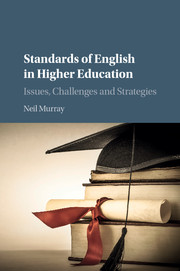Book contents
- Frontmatter
- Dedication
- Contents
- List of figures and tables
- Acknowledgements
- List of acronyms and abbreviations
- Introduction
- 1 The ‘English language question’ in the context of the changing face of higher education
- 2 English language: the need for and impact of policy and regulation
- 3 Seeking definitional clarity: what is ‘English language proficiency’?
- 4 Pre-enrolment language assessment and English language conditions of entry
- 5 Post-enrolment language assessment: challenges and opportunities
- 6 From assessment to provision
- 7 Innovation in English language provision: driving and navigating institutional change
- 8 Innovation in English language provision in higher education: an Australian case study
- References
- Appendices
- Index
2 - English language: the need for and impact of policy and regulation
Published online by Cambridge University Press: 05 November 2015
- Frontmatter
- Dedication
- Contents
- List of figures and tables
- Acknowledgements
- List of acronyms and abbreviations
- Introduction
- 1 The ‘English language question’ in the context of the changing face of higher education
- 2 English language: the need for and impact of policy and regulation
- 3 Seeking definitional clarity: what is ‘English language proficiency’?
- 4 Pre-enrolment language assessment and English language conditions of entry
- 5 Post-enrolment language assessment: challenges and opportunities
- 6 From assessment to provision
- 7 Innovation in English language provision: driving and navigating institutional change
- 8 Innovation in English language provision in higher education: an Australian case study
- References
- Appendices
- Index
Summary
Introduction
The regulation of any field of endeavour from without is normally an indication that things are not being sufficiently subjected to scrutiny and regulation within an institution, sector or field of activity, or that the scale of the activity concerned and the variation in the extent to which it is scrutinised and regulated is such that some form of external regulation and monitoring needs to be imposed. Few in higher education, and in particular those involved in the design and delivery of English language programmes, would deny that English language is one such area of activity; indeed, as I indicated in Chapter 1 (1.3.1), many would argue that some form of regulation is long overdue. As we have seen, for a variety of reasons the issue of English language proficiency in the university sector is one of growing prominence as, for both financial as well as reputational reasons, institutions recognise the advantages – indeed the necessity – of increasing the proportion of international students enrolling in their degree programmes. Failure to respond to that need will almost certainly result in an inability to compete in an increasingly crowded and competitive sector and, ultimately, to survive. However, enrolling more international students can be counterproductive if high numbers ultimately fail their courses, compromise standards and have difficulty securing employment post-graduation due to an insufficient level of English language competence.
As we saw in Chapter 1, the unprecedented and increasing pressure on universities to grow international student enrolments raises a number of very legitimate but complex questions and concerns involving the way in which universities are dealing with the issue of English language standards (Arkoudis, Baik and Richardson, 2012). This chapter unpacks some of those questions and concerns with a view to better understanding the rationale behind moves in countries such as the United Kingdom and Australia to regulate and monitor institutional English language strategies through internal mechanisms and external quality assurance agencies. In doing so, it will become evident that they implicate structures, processes and procedures that come into play prior to and during the student's course of study, as well as issues of competence, performance and perception post-graduation.
The rationale for regulation
English language entry requirements
English language entry requirements raise at least two questions that demand careful consideration.
- Type
- Chapter
- Information
- Standards of English in Higher EducationIssues, Challenges and Strategies, pp. 37 - 68Publisher: Cambridge University PressPrint publication year: 2015



